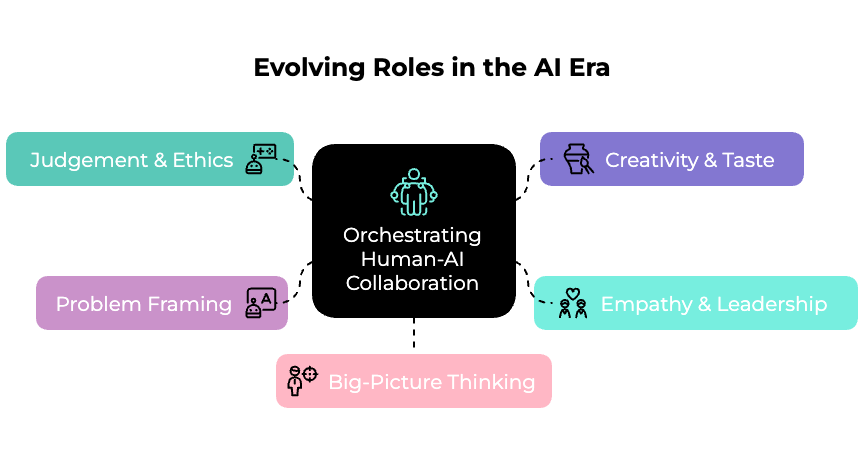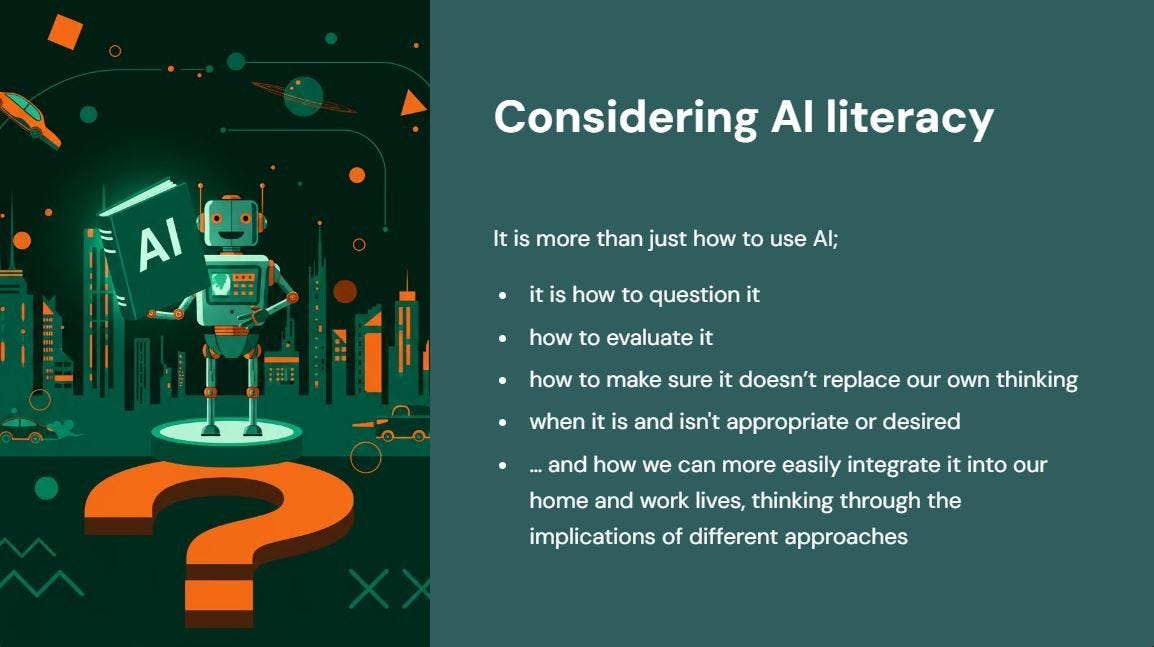Job Titles of Tomorrow
Beyond AI literacy - from player to conductor, learning to orchestrate the future of work
🌸 ikigai 生き甲斐 is a reason for being, your purpose in life - from the Japanese iki 生き meaning life and gai 甲斐 meaning worth 🌸
"AI literacy" "AI readiness" "AI fluency"
I come across terms like this a lot, but when I ask people what they actually mean by them, I get wildly different answers.
Considering how much I talk about magic, I’m actually pretty logical and structured most of the time. So when I am working on anything I like to start by ensuring definitions are clear.
I think precision in language, and therefore common understanding matters deeply. Especially though when I’m working on potentially life changing ideas. Because how can we help our friends, family, and community navigate this rapidly changing landscape if we can't agree on what they need to learn or why?
When I talk to people about their AI journey, I often get one of two reactions. Either overwhelm ("There's too much to learn, I'll never catch up") or indifference ("Why should I care? My job isn't going to change"). Both miss an important middle ground, that AI literacy doesn’t really mean becoming a technical expert, it's about understanding enough to take control of how these tools fit into your life and work.
Whatever label is put on it, I think I can most usefully help people by giving clarity about what they actually need to know. To do that well we need to help them assess where they are in their current understanding, and what specific next steps will be most helpful to them personally.
I spend a lot of time with those at the frontline, and current forecast says that for a lot of office or knowledge work jobs, what's being replaced isn't the whole job it's parts of the task bundle. But which parts? And who gets to decide?
Financial peeps may no longer build intricate spreadsheet models, but instead spend time telling the story behind the data. Marketers may not write every word of a campaign copy, but they'll decide the brand voice and emotional tone. Programmers might delegate routine coding to AI while focusing on system architecture and innovation.
This isn't quite job replacement, but it’s definitely a speeding up of task redistribution and therefore evolution of job titles is inevitable, and it's starting to happen whether we're ready or not.
Rethinking literacy for the AI age
Before we can meaningfully talk about AI literacy, we need to understand what literacy itself means in today's world.
The concept of literacy has evolved significantly over time. UNESCO now defines it as far more than just reading and writing;
"Beyond its conventional concept as a set of reading, writing and counting skills, literacy is now understood as a means of identification, understanding, interpretation, creation, and communication in an increasingly digital, text-mediated, information-rich and fast-changing world."
They emphasise that "literacy is a continuum of learning" that includes "digital skills, media literacy, education for sustainable development and global citizenship as well as job-specific skills."
Most importantly, UNESCO highlights that "literacy empowers and liberates people... improves lives by expanding capabilities which in turn reduces poverty, increases participation in the labour market and has positive effects on health and sustainable development."
When we apply this broader understanding to AI literacy, we see that it's about much more than technical knowledge. It's about empowerment; giving people the ability to identify, understand, interpret, create, and communicate in a world increasingly shaped by AI technologies.
From executor to orchestrator
I recently found myself struggling with this very issue. I was trying to create training materials for an AI workshop, oscillating between focusing on technical how-tos versus deeper principles. It wasn't until I started mapping out different tasks in my bullet journal, sorting them into what I believed humans should keep doing versus what AI could handle, that clarity emerged.
As we transition into increasingly AI-enhanced workplaces, the most valuable role isn't necessarily the people and/or AI tools/agents/workflows executing tasks, but it could for sure be the person orchestrating the entire process.
Think of it like conducting an orchestra. The conductor may not play any instrument themselves, but they understand how all the parts should work together to create something greater than the sum of its parts. They know when the strings should dominate and when they should soften to let the woodwinds shine. They make judgements about tempo, emphasis, and emotional tone that bring the music to life.
This is increasingly what our roles could become. We'll spend less time playing individual notes and more time ensuring all the instruments, human and AI, play in harmony toward something truly worthwhile.

When we workshop future scenarios like this, the relief is palpable. Most people don’t need to become AI experts, they just need to become better conductors of their work, making thoughtful decisions about which tasks to keep, which to delegate, and how to maintain the harmony between them.
Developing your orchestration skills
How do you prepare for this shift? Here are some of the key skills to cultivate;
1. Judgement and ethics
As AI handles more execution, human contributions centre around determining what's worth doing and ensuring it aligns with our values. Ethical reasoning becomes a professional superpower.
2. Creativity and taste
The ability to define what "good" looks like, to establish a voice or aesthetic, to choose between options, these become core professional skills. When AI can generate endless outputs, knowing which one matters is invaluable.
3. Empathy and leadership
Understanding human needs, coordinating diverse teams (including AI "members"), and inspiring others toward a shared vision remain uniquely human domains.
4. Problem framing
Before AI can solve a problem, someone must define what problem is worth solving. The ability to ask the right questions often matters more than generating answers.
5. Big-picture thinking
Seeing connections across domains, understanding broader contexts, and identifying emerging patterns help ensure AI tools serve meaningful purposes.
I've found my bullet journal invaluable for developing these skills. The process of reflecting on paper, away from digital distractions, helps me practice the very judgement and big-picture thinking that AI can't easily replicate. There's something about the analogue process of writing that creates space for the discernment AI literacy requires.
From terminology to transformation
While I initially thought the distinction between AI literacy and readiness mattered, I also know that debating terminology for too long misses the point. Whether we call it literacy, readiness, competency, or fluency, what really matters is helping people both understand AND apply these tools in ways that genuinely enhance their lives.
"AI literacy is generally defined as the knowledge and skills needed to understand, use, and critically evaluate AI. It focuses on what you know (concepts, tools, implications). AI competency or readiness builds on literacy by adding confidence and the ability to apply that knowledge in beneficial, real-world ways. In short: literacy is about knowing; readiness is about doing." - my synthesised definitions after lots of research!
The truth is, most people only truly grasp AI's potential when they start using it. The lightbulb moment rarely comes from a theoretical explanation, it comes from that first time AI helps you solve a real problem or creates something you couldn't have managed alone.
As I recently reflected in my journal; "Perhaps the best definition of AI literacy is simply having enough knowledge to start experimenting, and enough confidence to keep going when you hit the inevitable bumps."
We learn by doing, by experimenting, by trying these tools in contexts that matter to us personally. This is where my ikigai journey intersects with AI literacy, finding purpose isn't just about what you do, but about bringing mindfulness and intention to how you do it. Being the orchestrator rather than just an executor brings us closer to work that truly reflects our values and purpose.
The choice before us
Each of us faces a choice in how we approach AI. We can passively allow technology to reshape our worlds of work, potentially diminishing roles to whatever tasks AI hasn't yet mastered. Or we can actively orchestrate the human-AI relationship, making thoughtful decisions about what tasks we keep, what we delegate, and why.
True AI literacy means having the knowledge, confidence, and agency to make these choices intentionally rather than having them made for us.
The orchestra awaits your direction. What symphony will you conduct?
Sarah, seeking ikigai xxx
PS - Here's a bullet journal spread idea to help map your own task bundle and identify orchestration opportunities;
"Task Unbundling Map"
Draw a four-quadrant grid with these labels;
Upper right: "Joy/Skill" (tasks you enjoy and excel at)
Upper left: "Joy/Struggle" (tasks you enjoy but find challenging)
Lower left: "Drain/Struggle" (tasks you neither enjoy nor excel at)
Lower right: "Drain/Skill" (tasks you're good at but don't enjoy)
Try to plot some of your current work tasks across these quadrants, as you do, think about and highlight tasks that AI could potentially handle now or soon
Identify orchestration opportunities, where could you maintain creative direction while delegating execution?
Draft your ideal "task redistribution" that maximises time spent on what you do best and enjoy most - if your team doesn’t yet have an AI policy you could act as a champion and encourage thoughtful adoption in this manner.
PPS - Try this AI prompt to explore your own orchestration potential (or upload a picture of your bullet journal map from above!)
"I'd like to explore how AI might help me redistribute tasks in my role as [your job title]. Here are 5-10 key responsibilities in my current position: [list tasks]. For each task, could you help me analyse:
Which aspects require human judgment, creativity, or empathy
Which parts are more routine or could be AI-assisted
How I might restructure this responsibility to focus on orchestration rather than execution
What this might free me to do that would add more value"
PPPS - For a soundtrack that captures this transition from execution to orchestration, I’m listening to "Human" by The Killers. It asks a weird but compelling question "Are we human, or are we dancer?" - it makes me think that what makes us distinctly human isn't just what we do, but how we bring meaning, creativity, and connection to whatever we choose to do.
Interestingly, Brandon Flowers claimed this famous line was inspired by a disparaging comment made by Hunter S. Thompson, who supposedly stated that America was "raising a generation of dancers, afraid to take one step out of line." Subsequent attempts to track down the original quote have been unsuccessful, suggesting Flowers might have been misremembering, or was he being brilliantly gonzo journalist himself? *grin*
But whether the quote is authentic or not, the intent matters. In an age where AI increasingly handles execution, it's more important than ever that we take control and become high-agency individuals in our own lives. We can step completely out of the chorus line, not simply executing predetermined routines but orchestrating new possibilities. The important question isn't whether machines can do what we do, it's whether we can fully embrace what makes us uniquely human?



